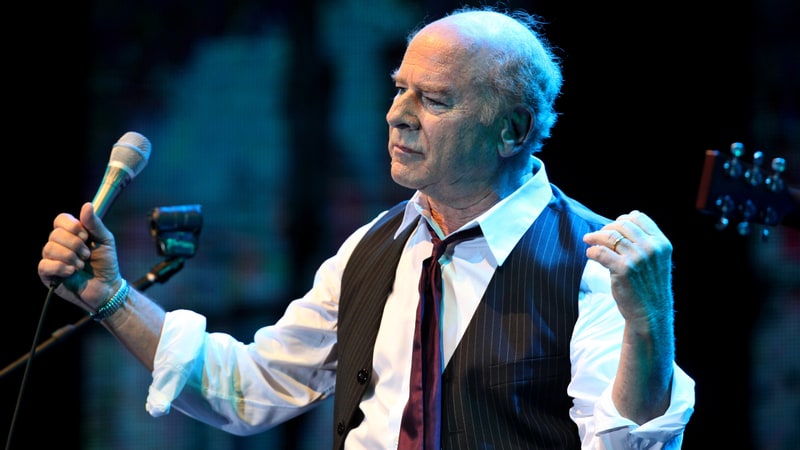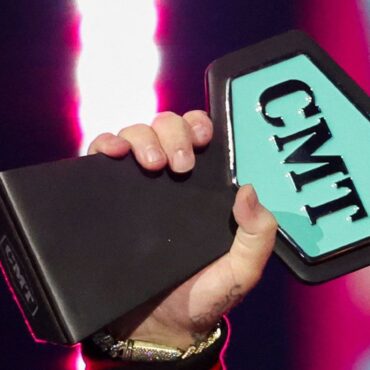chevron_left
-
play_arrow
NGradio So good... like you
share
close
In the spring of 1983, Art Garfunkel stepped out of his New York apartment building and began a walk across North America. The journey was conducted across 40 installments (always picking up exactly where the last one ended) and took him 14 years to complete. The whole time, he had a small notepad and pen in his back pocket. “I’d stay at two-star inns during the night,” he says. “And when inspiration struck me, I’d write little bits. There must have been a thousand of them.” Those bits included poems, lists, scattered thoughts and pointed anecdotes from his long career. He never gave much thought to publishing them until he showed them to literary agent Dan Strone a few years back. “He said, ‘You have a book here,'” recalls Garfunkel. “I then shaped them chronologically and said, ‘It’s my life.'”
The end result is What Is It All But Luminous: Notes From an Underground Man, which is unlike any book ever released by a rock star. There are segments about the formation and ultimate bitter dissolution of Simon and Garfunkel, along with other passages about his long life, but they are mixed in with lists of books he’s read and songs on his iPod, quotes from the likes of Shakespeare and Marvin Gaye, and set lists from his concerts. There are also numerous poems, including one about getting a colonic by a woman from Queens. (“After the evacuation behind the bathroom door, I mention the clickety sound of colonics, so she tap dances on the hardwood floor.”)
Right now, Garfunkel is perched on a chaise lounge on the roof of a luxury New York apartment building overlooking a picturesque, panoramic view of the skyline. He just returned from a U.S. book tour and he’s resting up before flying off to Japan for a series of solo dates. A grey, floppy hat rests on his head, a packet of Lifesavers peeks out of his front pocket, and in his hand is his book. Over the next hour, he happily fielded any question Rolling Stone threw his way, though, unsurprisingly, he didn’t feel like sharing why he’s no longer on speaking terms with Paul Simon.
I read about the fire at your apartment a couple years back. Are you living here now?
For now. [The smoke damage] led to a major fixing up of our place. My wife took over and I stepped back, so I’ve been living here. It’s been two years, but very shortly I get to move back in.
How bad was the damage?
Not so bad. We have three floors. The top floor is a library. I like to be up there to make my phones calls and do my writing. I love my books. I have 1,165 of them spread around the walls. Every one I read. In order. They’re good books. It’s Darwin, Origin of the Species, the good stuff. They are all there. Well, I lost one of the walls in the fire. There went a hundred of them. So I replaced them. Every damn one of them.
I’ve always been fascinated by your perfect handwriting. Did you write the whole book out by hand?
Yeah. When I was 11, Paul Simon, my fast friend, would say to people, “Look at my friend Artie, he’s the human typewriter.” It was sweet. But I hate to disappoint you, though I did write the whole book top to bottom with my left hand. And then Vicky Wilson, my great editor at Knopf, said to me, “Here’s what I want you to do. Give me your perfect A, B, C, D … and we will digitize that and we will have the ability to manipulate [and turn it into a font for the book.]”
Did you read books by other musicians while preparing for this one?
Well, there’s the famous Keith Richards book and the Clapton one. These books are giant sellers. I did not read either of them. I don’t put myself into the category of “rock star writing his biography.” That’s because we live our lives by falling into experiences. Things happen to us. Something you do takes hold of you and then you do a lot of it. And it has a name. And then it wraps itself around you and then an interviewer asks you, “When did you start this endeavor?”
Did you ever think about writing a traditional memoir without the poetry and lists and everything?
Well, you’re starting from the starting point as if a person begins with a desk and a clean piece of paper. But your premise is wrong. We don’t start with any beginning. We never know what we’re doing. We fall into it. I fell into these scraps of paper and I was told, “You may have a book here.” I started shaping it up. Dan Strone shopped it around. I fell into the experience. I knew it was different from other things. I’m always different. I’m an eccentric man.
There’s a bunch of books about Simon and Garfunkel. Have you read any of them?
I read one many years ago. What can I say? It didn’t capture … I think the main thing about us is that we’re good. We’re very good. We take two very different people, Artie and Paul, who have very different natures and found a fusion. It’s a cute trick.
You wrote in the book that your friendship with Paul was “shattered” in 1958 when he made a solo deal behind your back.
[Puts up his hands like a boxer] Now, watch out for Andy. He’s going to come in on you now. It’s what Muhammad Ali did.
“Shattered” is a pretty strong statement. You guys were just kids when that happened.
So you read my book properly. It’s a strong statement. Ask me your precise question, Mr. Greene.
I was just taken aback that you felt things were shattered that early. Did everything feel differently after that?
Yes.
Hmmm …
Notice that I’m not helping you much.
That’s OK.
But yes, it’s a very strong statement. You were wise to pick up on it and go, “Well, that upsets the whole Simon and Garfunkel thing.” I’m not going to fight that.
So how did you maintain your friendship with him during the Simon and Garfunkel days in the Sixties if you felt he shattered it before it even started?
You mean I should be a perfectionist and hope that friendships have no blemishes? Isn’t that compulsively … isn’t that too perfectionist? Everything has blemishes. I’m fooling around now with the answer. I’m saying, “Well, of course there’s stains. There’s stains in everything.” We try and accept them and carry on. It’s a mixed bag. You’re talking about a man who’s a tremendous talent. It’s a real turn-on to sit in the same room and make music with a tremendous talent.
I spoke to him about a year and a half ago. He told me you guys were no longer on speaking terms.
[Stares into my eyes and doesn’t respond]
May I ask what happened?
I don’t think you can because there are things that are personal and deep between us, instead of the Internet, your readers. …
That’s fair.
Good. I’m glad you see that.
In 2015 you called him a “jerk” and said that you “created a monster” by becoming his friend in the first place. Do you regret saying all that?
Yes. I do. [Smiling] You press people, you get stuff out of us. You’re going to come with one any minute. You’re going to find me relaxing and you’re going to come with the left hook.
Are you hopeful you two will patch things up and maybe sing together again one day?
Not particularly.
Why?
Now, the word “enough” just flew into my mind. …
OK. I’ll move on. I know I was pushing my luck there. How is your solo tour going now? I know that you’ve been back on the road now for a few years.
I love my show. I lost my voice in 2010. That’s seven years ago. Tragic. I had come off an arena tour with Pauly – [whispers] he goes, “Pauly? That sounds pretty friendly with me. They’re not that angry with each other. …” – in the Far East. When I got home a month later my voice went south. I couldn’t speak. I couldn’t sing. It was all froggy. When I saw the doctor, he said, “Yeah, the camera shows one of your two vocal cords is fat and stiff.” That’s what it felt like. But I was determined to not accept it’s gone. I don’t know how to be an Art Garfunkel that doesn’t sing. I was dedicated to my own recovery. And it took years. I would book a hall that was empty and sing to an empty hall.
It was terrible. 2012, no voice. I would fall to my knees and look up at God and say, “Oh, man, this is tough. I don’t know how to be a person.” And finally I would sing some shows where the voice crapped out. There were people in the audience. I did my best. I saw that there was lots of love and support. Here’s the insider [tip]: If you pretend that you are recovered and go onstage and do your best and take the bravery of being a little crappy, but also a little there, you pull your recovery along. And by 2014 I was singing again and I was grateful to God.
You have some tough songs to sing. The climax of “Bridge Over Troubled Water” would be tough for anybody.
I don’t do [sings] “Like a bridge. …” You went right to the one part of my recovery I haven’t gotten to. [Sings again] “Like a bridge …”
That’s just one little moment of one song.
One. The other 99.9 percent is there, but I rewrote the end of “Bridge.” It’s beautiful. Once my voice came back, I designed a “less is more” show.” I called my friend Tab Laven. He’s been my brother all the way through. He’s been playing Paul Simon. Not easy to do. We do half Simon and Garfunkel, because it would be coy to turn my back on it. And we do songs from my 12 solo albums. In the past year, we’ve picked up Dave Mackay, fabulous piano player. Boy, this is an exciting thing for me. Now we have piano in a whole bunch of songs. I’m captivated by my new show. I love it so much.
A lot of people lose their voice and never recover it. You must be so grateful.
You bet. I finish my show with a little prayer. “Now I lay me down to sleep, I pay the Lord my soul to keep. God will save me.” When I was five I realized I had a singing voice. It was pretty. It delighted me. So it’s a great gift in my throat. When you have a gift, you think about the giver. Who gave this to me? And this takes you to a spiritual sense of God. That has captivated me all through my life, serving that lucky gift.
Not a lot of people that were singing professionally in 1956 are still out there doing it.
I was a weird kid, a special kid.
It’s a shame there’s no film of you guys in the Tom and Jerry days. I’d love to see you on American Bandstand.
I would love to see Dick Clark ask Paul Simon where he was from. He said, “Macon, Georgia.” I would love to see my face.
It’s insane you had to go on after Jerry Lee Lewis singing “Great Balls of Fire.” It’s like a scene in a movie or something.
Yeah. It was great. I was a fan of American Bandstand. I would come home from school and watch those dancing kids.
Then you were on it.
My life spun around. It’s because at age five I realized I could sing good. Then at age 11 I met this guy, Paul Simon. We fused our talents. Never forget this: Allen Freed brought this new, subversive music to New York in 1954. And we were 12, 13, a great age to be impressionable. Same as John Lennon, Paul McCartney, Bob Dylan. This is our age group. Rock & Roll, that was Alan Freed’s phrase, was born in the Western world.
It’s always amazed me that so many of you guys were born in this tiny window of time in the early 1940s. A few years earlier you would have been too old when rock hit. Before that, you would have been fighting in World War II. You had perfect timing.
America was sitting pretty. We won World War II. We were rich. We were benevolent. We were charitable, the Marshall Plan. As God gave me a singing voice, America gave the Western world the means to get back on their feet. That’s why I look at today as such a tough time.
I like to think it’s temporary. It’s a bad chapter that will end in a few years, if not sooner.
So we’re not falling off a cliff together? That’s the theory and its so tempting.
I think we have to view it as a few big steps backwards, but progress will continue.
Yes. We must think that.
Source: rollingstone.com
Written by: New Generation Radio
Rate it
ΔΗΜΟΦΙΛΗ ΑΡΘΡΑ
COPYRIGHT 2020. NGRADIO





















Post comments (0)